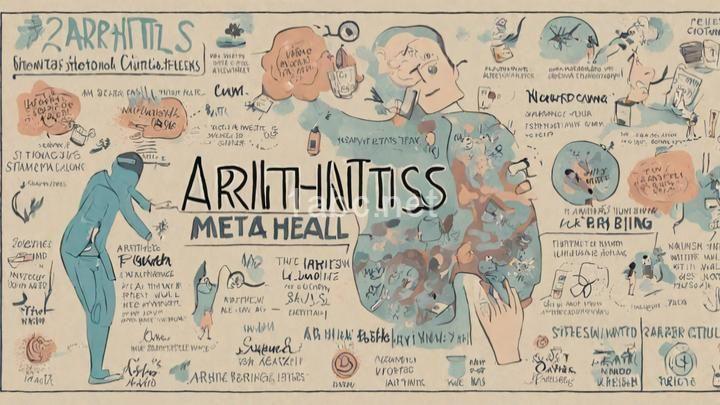Mind-Body Connection: How Stress Management Techniques Can Help Ease Arthritis Symptoms

Introduction:
Hello there, fellow readers! Today, we are diving into the fascinating world of the mind-body connection and how it can bring relief to those suffering from arthritis symptoms. But first, let's take a moment to appreciate how understanding this connection can truly make a difference in our lives. By exploring stress management techniques, we can alleviate the impact of arthritis on our physical and emotional well-being. So, grab a cup of tea, get cozy, and let's explore the wonderful ways in which we can ease arthritis symptoms through the mind-body connection.
I. Understanding Arthritis and Its Impact on Daily Life:
Arthritis, a condition that affects millions of individuals worldwide, can have a significant impact on our daily lives. It comes in various forms, such as osteoarthritis, rheumatoid arthritis, and psoriatic arthritis, each with its own set of symptoms and challenges. Arthritis doesn't just affect us physically; it also takes an emotional toll on our well-being. The pain, stiffness, and inflammation associated with arthritis can make simple tasks like opening a jar or walking up the stairs a daunting endeavor. Emotionally, the constant pain and limitations can lead to frustration, sadness, and even anxiety.
It's important to acknowledge the challenges arthritis poses in our lives. By doing so, we can better understand the importance of finding effective ways to manage the condition and improve our overall well-being. So, let's dive into the mind-body connection and how it can bring relief to those living with arthritis.
II. The Mind-Body Connection:
The mind-body connection refers to the intricate relationship between our thoughts, emotions, and physical health. It's an interconnected system where our mental and emotional well-being can influence our physical health, and vice versa. When it comes to arthritis, stress plays a crucial role in exacerbating symptoms. When we experience stress, our bodies release cortisol and other stress hormones, leading to increased inflammation and pain. By managing stress effectively, we can reduce its impact on our arthritis symptoms.
Now, let's break down this concept further. Imagine a day when you wake up feeling stressed, overwhelmed, and anxious. As the day progresses, you begin to notice that your arthritis symptoms are more pronounced. Your joints ache, and you find it harder to move freely. On another day, you wake up feeling calm, relaxed, and at peace. To your surprise, you notice that your arthritis symptoms are less bothersome. This is the mind-body connection in action.
Understanding this connection allows us to take control of our well-being and find ways to ease arthritis symptoms. By managing stress effectively, we can reduce inflammation, alleviate pain, and improve our overall quality of life. So, let's explore stress management techniques that can make a real difference.
III. Stress Management Techniques for Arthritis Relief:
1. Deep Breathing Exercises:
Deep breathing exercises are a simple yet powerful tool for relaxation. By focusing on our breath, we can activate the body's relaxation response and counteract stress. One effective technique is diaphragmatic breathing, also known as belly breathing. To practice this technique, find a comfortable position, place one hand on your belly, and take a slow, deep breath in through your nose. Feel your belly rise as you inhale, and then exhale slowly through your mouth. Repeat this for a few minutes, allowing yourself to fully relax and let go of tension.
2. Meditation and Mindfulness:
Meditation and mindfulness practices have been used for centuries to promote relaxation and well-being. By incorporating these practices into our daily lives, we can reduce stress and enhance our ability to cope with arthritis symptoms. Meditation involves focusing our attention on a specific object, word, or breath, while mindfulness is about being fully present in the moment. Both practices can help us cultivate a sense of calm, improve pain tolerance, and enhance our mental well-being. There are numerous meditation techniques to explore, from guided meditations to loving-kindness meditation. You can also make use of meditation apps or online resources to support your practice.
3. Physical Activity:
Regular physical activity is not only beneficial for our overall health but also plays a crucial role in stress management. Engaging in low-impact exercises like swimming, yoga, or tai chi can help reduce stress levels while being gentle on our joints. These activities promote flexibility, strength, and relaxation, all of which can contribute to easing arthritis symptoms. It's important to find activities that suit your abilities and preferences. Remember, even small bursts of movement throughout the day, like taking short walks or stretching, can make a big difference.
4. Social Support and Emotional Well-being:
Arthritis can be emotionally challenging, and seeking social support is essential for our well-being. Connecting with friends, family, or support groups allows us to share our experiences, find understanding, and alleviate the emotional burden of living with arthritis. Surrounding ourselves with positivity and maintaining a positive mindset can also help reduce anxiety and improve our overall outlook. Engage in activities that bring you joy, practice gratitude, and be kind to yourself. Remember, you are not alone on this journey.
Conclusion:
Congratulations on reaching the end of our exploration into the mind-body connection and stress management techniques for easing arthritis symptoms. We've covered a lot of ground, from understanding the impact of arthritis on daily life to exploring the power of stress management in alleviating symptoms. By incorporating deep breathing exercises, meditation and mindfulness, physical activity, and seeking social support, we can create a holistic approach to managing our arthritis. Remember, you have the power to improve your well-being through the mind-body connection. Take a deep breath, embrace the journey, and know that relief is within reach. Keep exploring different techniques, find what resonates with you, and let the mind-body connection work its magic. Cheers to a happier and healthier you!
FREQUENTLY ASKED QUESTIONS
How does stress affect arthritis symptoms?
Stress can have a significant impact on arthritis symptoms. When we experience stress, our bodies release certain hormones, such as cortisol, that can trigger inflammation and worsen arthritis symptoms. Additionally, stress can lead to muscle tension and increased pain sensitivity, making the pain associated with arthritis feel more intense.Furthermore, stress can also affect our immune system and make it less efficient in controlling inflammation, which is a key factor in arthritis. This can result in increased joint swelling, stiffness, and discomfort.
Moreover, stress can disrupt sleep patterns, which can further aggravate arthritis symptoms. Lack of quality sleep can lead to increased pain and fatigue, making it even more challenging to manage arthritis on a daily basis.
It's important to note that managing stress can play a crucial role in alleviating arthritis symptoms. Engaging in stress-reducing activities such as exercise, meditation, and deep breathing exercises can help control stress levels and potentially improve arthritis symptoms.
In summary, stress can exacerbate arthritis symptoms by triggering inflammation, increasing pain sensitivity, and disrupting sleep patterns. By adopting stress-management techniques, individuals with arthritis may experience a reduction in symptoms and an improved overall quality of life.
What is the mind-body connection?
The mind-body connection refers to the intricate relationship between our thoughts, emotions, and physical well-being. It acknowledges that our mental state can have a significant impact on our physical health and vice versa. This connection highlights the interconnectedness of our mind and body, illustrating how one can influence the other.Our thoughts and emotions can trigger physiological responses in our body. For example, feeling stressed or anxious can lead to increased heart rate, tense muscles, and shallow breathing. On the other hand, positive emotions like happiness and relaxation can promote a sense of well-being, leading to improved physical health.
Conversely, our physical health can also affect our mental state. Chronic pain or illness, for instance, can lead to feelings of frustration, sadness, or even depression. Similarly, engaging in regular exercise or practicing relaxation techniques can boost our mood and overall mental well-being.
Understanding the mind-body connection can help us take a holistic approach to our health. By recognizing the influence our thoughts, emotions, and physical state have on each other, we can make conscious efforts to improve our well-being. This may involve practices such as mindfulness, meditation, exercise, therapy, or adopting positive thinking patterns.
Overall, the mind-body connection emphasizes the importance of nurturing both our mental and physical health to achieve overall wellness.
Can stress management techniques really help with arthritis symptoms?
Yes, stress management techniques can indeed help with arthritis symptoms. While stress does not directly cause arthritis, it can exacerbate the symptoms and make them more intense. When we experience stress, our bodies release certain chemicals that can increase inflammation and pain, which are common symptoms of arthritis.By practicing effective stress management techniques, such as deep breathing exercises, meditation, yoga, or engaging in hobbies and activities that bring joy and relaxation, we can reduce the overall stress levels in our bodies. This, in turn, can help alleviate arthritis symptoms and improve overall well-being.
When we find healthy ways to manage stress, we are better equipped to cope with the challenges and pain associated with arthritis. Additionally, stress management techniques can also help improve sleep quality, boost mood, and reduce fatigue, all of which can have a positive impact on managing arthritis symptoms.
It's important to remember that stress management techniques are not a cure for arthritis, but they can be a helpful complementary approach to managing the condition. Consulting with a healthcare professional or a qualified therapist can further guide individuals in finding the most suitable stress management techniques for their specific needs.
So, if you are experiencing arthritis symptoms and want to explore ways to alleviate them, incorporating stress management techniques into your daily routine may be beneficial. Give it a try and see how it can positively impact your overall well-being.
What are some common stress management techniques that can be used for arthritis?
Arthritis can be a challenging condition to manage, as it often comes with pain and discomfort that can contribute to stress. Fortunately, there are several stress management techniques that can be helpful for individuals with arthritis. Here are some common techniques you can try:
-
Exercise: Engaging in regular physical activity can help reduce stress levels. Low-impact exercises such as swimming, walking, or cycling can be beneficial for individuals with arthritis. Always consult with your healthcare provider before starting any exercise routine.
-
Relaxation techniques: Practicing relaxation techniques like deep breathing exercises, meditation, or yoga can help calm the mind and reduce stress. These techniques can also help manage pain associated with arthritis.
-
Time management: Organizing your daily tasks and prioritizing them can help reduce stress levels. Breaking larger tasks into smaller, manageable steps can make them feel less overwhelming.
-
Social support: Connecting with others who understand your experience with arthritis can provide emotional support and help alleviate stress. Consider joining a support group or reaching out to friends and family members for support.
-
Healthy lifestyle choices: Maintaining a healthy lifestyle can contribute to overall well-being and stress reduction. Eating a balanced diet, getting enough sleep, and limiting alcohol and caffeine intake can all play a role in managing stress.
It's important to note that everyone's experience with arthritis is unique, so it may be helpful to try different techniques and see what works best for you. Additionally, consulting with a healthcare professional can provide personalized guidance and additional strategies for managing stress associated with arthritis.



